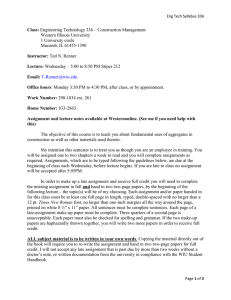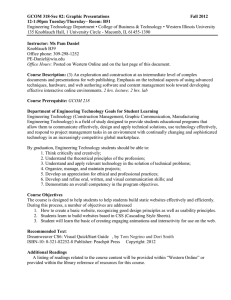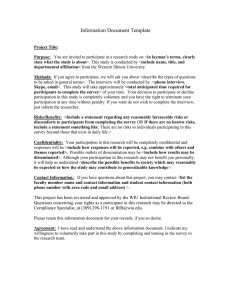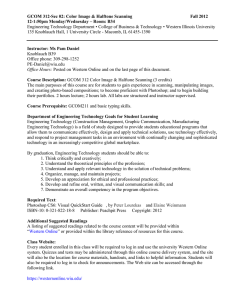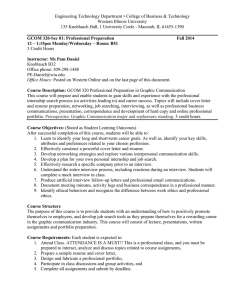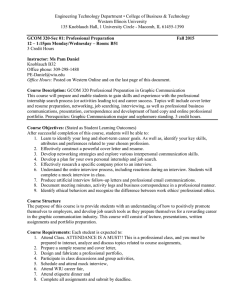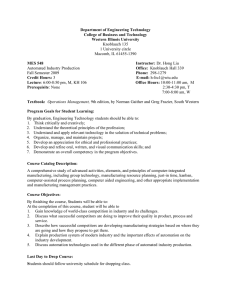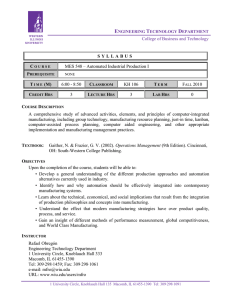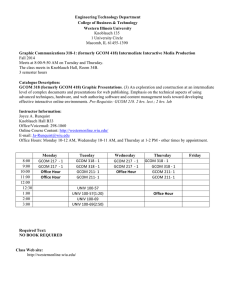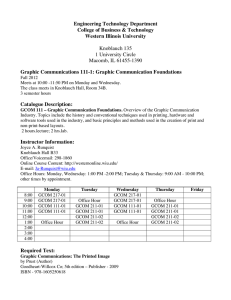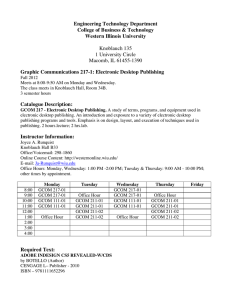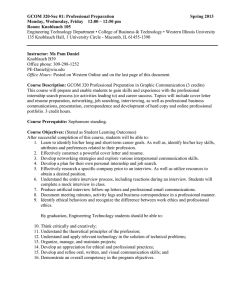GCOM 320-Sec 01: Professional Preparation Fall 2012
advertisement
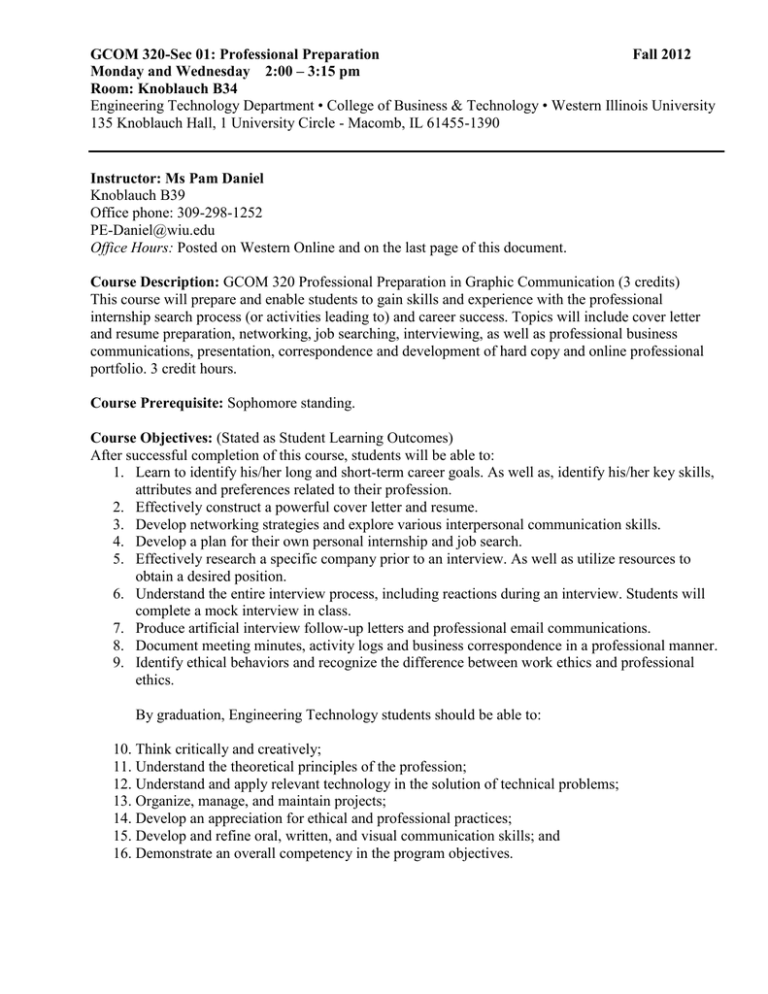
GCOM 320-Sec 01: Professional Preparation Fall 2012 Monday and Wednesday 2:00 – 3:15 pm Room: Knoblauch B34 Engineering Technology Department • College of Business & Technology • Western Illinois University 135 Knoblauch Hall, 1 University Circle - Macomb, IL 61455-1390 Instructor: Ms Pam Daniel Knoblauch B39 Office phone: 309-298-1252 PE-Daniel@wiu.edu Office Hours: Posted on Western Online and on the last page of this document. Course Description: GCOM 320 Professional Preparation in Graphic Communication (3 credits) This course will prepare and enable students to gain skills and experience with the professional internship search process (or activities leading to) and career success. Topics will include cover letter and resume preparation, networking, job searching, interviewing, as well as professional business communications, presentation, correspondence and development of hard copy and online professional portfolio. 3 credit hours. Course Prerequisite: Sophomore standing. Course Objectives: (Stated as Student Learning Outcomes) After successful completion of this course, students will be able to: 1. Learn to identify his/her long and short-term career goals. As well as, identify his/her key skills, attributes and preferences related to their profession. 2. Effectively construct a powerful cover letter and resume. 3. Develop networking strategies and explore various interpersonal communication skills. 4. Develop a plan for their own personal internship and job search. 5. Effectively research a specific company prior to an interview. As well as utilize resources to obtain a desired position. 6. Understand the entire interview process, including reactions during an interview. Students will complete a mock interview in class. 7. Produce artificial interview follow-up letters and professional email communications. 8. Document meeting minutes, activity logs and business correspondence in a professional manner. 9. Identify ethical behaviors and recognize the difference between work ethics and professional ethics. By graduation, Engineering Technology students should be able to: 10. Think critically and creatively; 11. Understand the theoretical principles of the profession; 12. Understand and apply relevant technology in the solution of technical problems; 13. Organize, manage, and maintain projects; 14. Develop an appreciation for ethical and professional practices; 15. Develop and refine oral, written, and visual communication skills; and 16. Demonstrate an overall competency in the program objectives. Course Requirements: Each student is expected to: 1. Attend Class. ATTENDANCE IS A MUST!! This is a professional class, and you must be prepared to interact, analyze and discuss topics related to course assignments, 2. Prepare a sample resume and cover letter, 3. Create a portfolio of all assignments, papers and projects from this course, 4. Design and fabricate a professional portfolio, 5. Participate in class discussions and group activities, and 6. Complete all assignments and submit by deadline. Department of Engineering Technology Goals for Student Learning Engineering Technology (Construction Management, Graphic Communication, Manufacturing Engineering Technology) is a field of study designed to provide students educational programs that allow them to communicate effectively, design and apply technical solutions, use technology effectively, and respond to project management tasks in an environment with continually changing and sophisticated technology in an increasingly competitive global marketplace. By graduation, Engineering Technology students should be able to: 1. Think critically and creatively; 2. Understand the theoretical principles of the profession; 3. Understand and apply relevant technology in the solution of technical problems; 4. Organize, manage, and maintain projects; 5. Develop an appreciation for ethical and professional practices; 6. Develop and refine oral, written, and visual communication skills; and 7. Demonstrate an overall competency in the program objectives. Class Website: Every student enrolled in this class will be required to log in and use the university WesternOnline system. Quizzes and tests may be administered through this online course delivery system, and the site will also be the location for course materials, handouts, and links to helpful information. Students will also be required to log in to check for announcements. The Web site can be accessed through the following link. https://westernonline.wiu.edu/ Log in using your “ecom” information and password. Please note this is the same as your e-mail log in and password. I will assist you in logging in if you have problems. I cannot assign you an “ecom” account, and I do not have access to your info or passwords. You will have to contact UCSS directly if you are having problems logging into the system. For questions concerning access to Western Online you can call: 298-2704 or email: support@wiu.edu If you miss a class for some reason, check the Western Online site to find out what you may have missed. Often times I will post assignments directly on the course Web site. I will also try to update the weekly announcements so that you will know of upcoming deadlines. Class Facebook Page Every student enrolled in this class will be required to “Friend” GCOM 320 @wiu on Facebook. This social media group page will be the location for course announcements, surveys and links to helpful information. This Facebook page can be accessed through the following link. http://www.facebook.com/Gcom320 Additional Suggested Readings A listing of suggested readings related to the course content will be provided within “Western Online” or provided within the library reference of resources for this course. Required Technologies: At least a 1GB external flash drive to say or backup your files. Do not save digital documents on the computers. Lost work due to technology failure is not an excuse. Topic Outline & Tentative Schedule: Aug 20 M Course Overview & Identifying Goals, Skills, Attributes for your Profession 22 W Who am I and what do I want 27 M Identifying Personal Skills 29 W Constructing a Powerful Cover Letter Sept 3 M Labor Day 5 W Creating a resume 10 M Peer review of Cover Letters 12 W Professional Networking - 30 Second Elevator Speech 17 M Peer Review of Resume 19 W Interview Questions 24 M Prepare for an Interview, Etiquette/Dress for Success 26 W During an Interview - Interview Questions Oct 1 M Interview Answers – Peer Mock Interviews 3 W After an Interview – Thank you letter 8 M Set up an eRecruiting account with Career Services 10 W Accepting a job offer & Review for Midterm 15 M Midterm Exam 17 W 5 min. Presentations (What are employers are really looking for?) 22 M 5 min. Presentations (Professional & Workplace Ethics) 24 W Professional Letters, Email Communications & the Employee Manual 29 M Prepare for Career Fair (held on Oct. 30) 31 W Career Goals Nov 5 M Group Project/Presentation (10 minute Presentation) 7 W Group Project/Presentation (10 minute Presentation) 12 M 5 Portfolio Focus Pieces – Group Discussion 14 W Portfolio Focus Presentations to Class 19 – 23 Fall Break 26 M Ordering Portfolio Contents – Prepare for an Interview 28 W Take-Away Portfolio – Portfolio Quiz Dec 3 M PDF portfolio construction 5 W Review for Final – Portfolio Self Evaluation 12 M Final Exam, 3pm Last Day to Drop Course: October 28, 2012 Grading: Your grade will be determined on successfully achieving the requirements of this course. The course requirements and percent of your grade are as follows: Class projects: 40% Presentation 5% Group project 5% Professional Portfolios: 20% Participation/attendance: 10% Midterm & Final exams: 20% All points will be cumulative and be totaled, ranked and graded according to the following scale: A = 92-100 A- = 90-91 B+ = 88-89 B = 82-87 B- = 80-81 C+ = 78-79 C = 72-77 C- = 70-71 D+ = 68-69 D = 62-67 D- = 60-61 F = 59 and below Method(s) of Evaluation/Assessment: Group and single work projects, field trip reports/summaries, and reflection papers. Peer reviews Oral/Visual presentations Course portfolio Participation Quizzes, Midterm and Final Examination (Time/date prescribed on university final exam schedule) Any exceptions to the final exam schedule must be approved by department chair and the Dean of the College of Business and Technology in writing including student’s name, ID# and signatures. Rules for Giving an Incomplete WIU policy – A temporary symbol of I (Incomplete) for a course may be given only when a student, due to circumstances beyond his or her control, has been unable to complete the course requirements within the official limits of the term. The circumstances must be documented to the instructor’s satisfaction. Class Attendance: In a class such as this, the only way to learn as a student is to be present. Therefore, students are required to attend class. I will be taking roll through out the semester, and it is required that you be in class on a regular basis…. If you are not in class, you will not be learning with the other students, and you WILL fall behind. In the case of unexcused absences, I am under no obligation to aid you, the student, in making up missed assignments or missed lectures. Excused absences are those that you tell me about before hand, or those that happen under unexpected consequences such as a death or illness. Unexpected consequences do not include hangovers, naps, or sunny afternoons. Excused absences must be supported with written documentation. Further, it is the responsibility of the student to provide documentation if an excused absence is to be granted. In this course, three unexcused absences are permitted without a reduction in grade. After three unexcused absences, each unexcused absence will result in a letter grade reduction. In all cases of absences, it is your responsibility to get the lecture material you missed, or find out what projects we may have started or finished. In addition, arriving late and leaving early will be not be acceptable, unless you have a good reason to do so. Each student is expected to stay to the end of the scheduled class period and aid classmates with learning opportunities. Absences, late arrivals, and early departures will have a direct effect on your grade. If you decide to take a week or two off, I can guarantee that your grade will be directly affected and you will have a hard time passing the course. Someone is paying for you to be in this class, so take advantage of my knowledge and desire to teach, and be in class on a regular basis. IMPORTANT NOTE: Cell phones are prohibited in the classroom and the laboratory. The first time it goes off in class you will automatically lose 5 points from your final exam grade, the second time you will lose an additional 10 points (15 points total), the third time you will lose an additional 20 points (35 points total), etc … you should also refrain from texting during class. Put your phone away! INTERNET/E-MAIL: you are welcome to surf and check your e-mail before or after class, or during lab time. I do not want you surfing, chatting, or e-mailing as I am lecturing or during times in which you are supposed to be doing something class related. You really can live for a little while without checking your friend’s updates. RESPECT: When working in the computer lab or listening to a lecture make sure you respect you classmates and your instructor. When you are in this class, you should be focused on this class. ASSIGNMENTS: Specific assignments will be made throughout the semester. These assignments will change, depending upon the class. Assignments must be turned in by assigned date, no exceptions. Disability Support Services For students with special needs, please review this website [http://www.wiu.edu/student_services/disability_resource_center/students/] for more information. Western Illinois University is committed to justice, equity, and diversity. Providing equal opportunities for students with disabilities is a campus-wide responsibility and commitment in which Disability Support Services (DSS) plays a primary role. Access & Disabilities “In accordance with University policy and the Americans with Disabilities Act (ADA), academic accommodations may be made for any student who notifies the instructor of the need for an accommodation. For the instructor to provide the proper accommodation(s) you must obtain documentation of the need for an accommodation through Disability Resource Center (DRC) and provide it to the instructor. It is imperative that you take the initiative to bring such needs to the instructor's attention, as he/she is not legally permitted to inquire about such particular needs of students. Students who may require special assistance in emergency evacuations (i.e. fire, tornado, etc.) should contact the instructor as to the most appropriate procedures to follow in such an emergency. Contact Disability Resource Center (DRC) at 298-2512 for additional services.” If you have emergency medical information to share with me, if you need special arrangements in case the building must be evacuated, or if you need accommodations in this course because of a disability, please make an appointment with me as soon as possible. My office location and hours are listed in this syllabus. If you plan to request disability accommodations, you are expected to register with the Disability Resource Center (DRC) at 298-2512. Counseling Services The University Counseling Center (UCC) provides free personal, academic, and career counseling services to all WIU undergraduates and graduates. Individual, couple, and group counseling is available and all counseling sessions are confidential [http://www.student.services.wiu.edu/ucc/]. Academic Integrity: Review this website [http://www.wiu.edu/policies/acintegrity.php] for definitions and examples are not meant to be exhaustive. The University reserves the right to determine, in a given instance, what action constitutes a violation of academic integrity. Preamble: Western Illinois University, like all communities, functions best when its members treat one another with honesty, fairness, respect, and trust. Students have rights and responsibilities (http://www.wiu.edu/provost/students/) and students should realize that deception for individual gain is an offense against the members of the entire community, and it is the student's responsibility to be informed and to abide by all University regulations and policies on Academic Integrity. Plagiarism, cheating, and other forms of academic dishonesty constitute a serious violation of University conduct regulations. Students who engage in dishonesty in any form shall be charged with academic dishonesty. It is a duty of faculty members to take measures to preserve and transmit the values of the academic community in the learning environment that they create for their students and in their own academic pursuits. To this end, they are expected to instill in their students a respect for integrity and a desire to behave honestly. They are also expected to take measures to discourage student academic dishonesty, to adjust grades appropriately if academic dishonesty is encountered, and, when warranted, to recommend that additional administrative sanctions be considered. Grading policies are the exclusive prerogative of the faculty; administrative sanctions are under the authority of the Director of Student Judicial Programs. This document provides policies and procedures to be followed when academic dishonesty is encountered. Definitions of Academic Dishonesty The following definitions and examples are not meant to be exhaustive. The University reserves the right to determine, in a given instance, what action constitutes a violation of academic integrity. (See www.wiu.edu/policies/acintegrity.php for complete descriptions of the following topics: Plagiarism, Fabrication and Falsification, Cheating, Complicity in Academic Dishonesty, Abuse of Academic Materials, Multiple Submissions Reporting Academic Dishonesty All members of the University community share the responsibility and authority to challenge and make known acts of apparent academic dishonesty. Any student, faculty member, or staff person who has witnessed an apparent act of student academic dishonesty, or has information that reasonably leads to the conclusion that such an act has occurred or has been attempted, has an ethical responsibility for reporting said act(s). Confronting and reporting academic dishonesty can be done in a variety of ways, and people should choose the manner most appropriate for the circumstances. Acts of apparent academic dishonesty that occur in the classroom should be reported directly to the course instructor, and/or the course instructor's Department Chair, and/or the instructor's College Dean. The Council on Admission, Graduation, and Academic Standards (CAGAS) or the Graduate Council will not accept or act upon anonymous reports, but will hold in strict confidence the identity of any person reporting a suspected instance of academic dishonesty, unless that person consents to having his/her identity revealed. Resolution of Problems Should a problem occur, students should speak to their instructor first. If the problem is not resolved, meet with the chair of the department. If the problem continues to be unresolved, go to the College of Business and Technology’s Dean. Students should observe the following sequence for the resolution of problems: Student --- Instructor --- Chairperson --- Dean Office Hours: Appointments outside of scheduled office hours may be made by calling, emailing or talking in person with the instructor at least 24 hours prior to meeting time. Look for confirmation of appointment (via the method used to make appointment) before your arrival. Monday 11-12pm Office 12-1:50pm Tuesday 11-12pm Office 12-1:50pm Wednesday 11-12pm Office 12-1:50pm Thursday 11-12 pm Office 12-1:50 pm GCOM 312 2-3:15pm GCOM 320 GCOM 318 2-3:50 pm GCOM 313 GCOM 312 2-3:15pm GCOM 320 GCOM 318 2-3:50 pm GCOM 313 GCOM 320 –Fall 2012 Upon reading your syllabus, please sign the following form. This form will act as a contract between you (the student) and me (the professor). By signing the form you acknowledge reading the syllabus and understanding such things as; what might happen if you break the honor code (you fail the project, fail the course, and are reported to the University honor code office), what might happen if you do not turn in a project on time, what might happen if you miss more than one class (your grade will suffer). This “contract” allows me to know you have read the syllabus and understand the consequences. On a different note, by reading the syllabus and signing this form, you also understand how it is easy to pass this course, and get a good grade; show up to class everyday, complete your projects on time, do a little more than the assignment asks for, and clean up after yourself. Please print your name and sign the line below, and turn this into me at the end of class. Thanks! Print your name here: ________________________________________________ Print your preferred e-mail address here __________________________________________ Sign your name here: ________________________________________________
